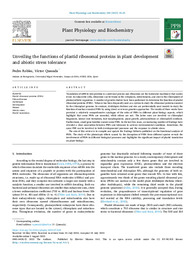Título :
Unveiling the functions of plastid ribosomal proteins in plant development
and abiotic stress tolerance |
Autor :
Robles, Pedro
Quesada, Víctor |
Editor :
Elsevier |
Departamento:
Departamentos de la UMH::Biología Aplicada |
Fecha de publicación:
2022-08 |
URI :
https://hdl.handle.net/11000/38364 |
Resumen :
Translation of mRNAs into proteins is a universal process and ribosomes are the molecular machinery that carries
it out. In eukaryotic cells, ribosomes can be found in the cytoplasm, mitochondria, and also in the chloroplasts of
photosynthetic organisms. A number of genetic studies have been performed to determine the function of plastid
ribosomal proteins (PRPs). Tobacco has been frequently used as a system to study the ribosomal proteins encoded
by the chloroplast genome. In contrast, Arabidopsis thaliana and rice are preferentially used models to study the
function of nuclear-encoded PRPs by using direct or reverse genetics approaches. The results of these works have
provided a relatively comprehensive catalogue of the roles of PRPs in different plant biology aspects, which
highlight that some PRPs are essential, while others are not. The latter ones are involved in chloroplast
biogenesis, lateral root formation, leaf morphogenesis, plant growth, photosynthesis or chlorophyll synthesis.
Furthermore, small gene families encode some PRPs. In the last few years, an increasing number of findings have
revealed a close association between PRPs and tolerance to adverse environmental conditions. Sometimes, the
same PRP can be involved in both developmental processes and the response to abiotic stress.
The aim of this review is to compile and update the findings hitherto published on the functional analysis of
PRPs. The study of the phenotypic effects caused by the disruption of PRPs from different species reveals the
involvement of PRPs in different biological processes and highlights the significant impact of plastid translation
on plant biology.
|
Palabras clave/Materias:
Plastid ribosomal proteins (PRPs)
Chlororibosome
Arabidopsis
Development
Mutant
Abiotic stress
Plastid translation |
Área de conocimiento :
CDU: Ciencias puras y naturales: Biología: Biología celular y subcelular. Citología |
Tipo de documento :
info:eu-repo/semantics/article |
Derechos de acceso:
info:eu-repo/semantics/openAccess |
DOI :
https://doi.org/10.1016/j.plaphy.2022.07.029 |
Publicado en:
Plant Physiology and Biochemistry 189 (2022) 35–45 |
Aparece en las colecciones:
Artículos - Biología Aplicada
|

 La licencia se describe como: Atribución-NonComercial-NoDerivada 4.0 Internacional.
La licencia se describe como: Atribución-NonComercial-NoDerivada 4.0 Internacional.
.png)